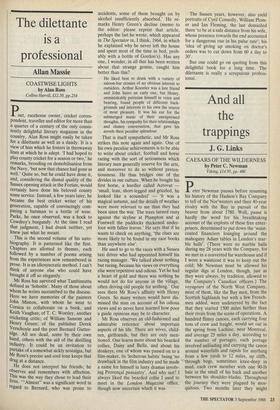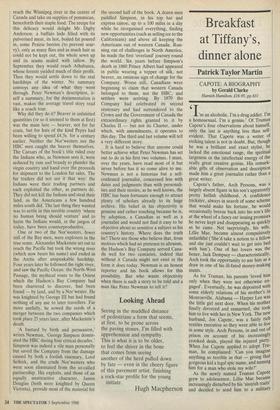And all the trappings
J. G. Links
CAESARS OF THE WILDERNESS by Peter C. Newman Viking, £14.95, pp. 480 Peter Newman pauses before resuming his history of the Hudson's Bay Company to tell of the Nor'westers and their 40-year rivalry with the Bay in pursuit of the beaver from about 1780. Well, pause is hardly the word for his breathtaking account of the exploits of these free enter- prisers, determined to put down the 'waist- coated financiers lounging around the mahogany Adam tables in London's mar- ble halls'. (There were no marble halls during my 28 years with the Company, for we met in a converted fur warehouse and if I wore a waistcoat it was to keep out the cold; Mr Newman must be allowed his regular digs at London, though, just as they were always, by tradition, allowed to the Company's Canadian officers.) The voyageurs of the North West Company, most of them, like the Bay men, from the Scottish highlands but with a few French- men added, were undeterred by the fact that they started 1500 miles further than their rivals from the scene of operations. A hundred flimsy canoes, each carrying four tons of crew and freight, would set out in the spring from Lachine, near Montreal, and average 25 miles a day, according to the number of portages; each portage involved unloading and carrying the canoe around waterfalls and rapids for anything from a few yards to 12 miles, up cliffs, 'through bogs, sometimes knee-deep in mud, each crew member with one 90-lb bale in the small of his back and another between his shoulder-blades. Throughout the journey they were plagued by mos- quitoes. Two months later they might
reach the Winnipeg river in the centre of Canada and take on supplies of pemmican, henceforth their staple food. The recipe for this delicacy would delight Mr Digby Anderson: a buffalo hide filled with its pulverised meat, its hot, boiled fat poured in, some Prairie berries (to prevent scur- vy), only as many flies and as much hair as could not be kept out, the whole sewn up and its seams sealed with tallow. By September they would reach Athabasca, whose forests yielded much of their profit. Then they would settle down to the real hardships of the winter. No summary conveys any idea of what they went through. Peter Newman's description, it- self a summary, for the documentation is vast, makes the average travel story read like a coach tour.
Why did they do it? Beaver in unlimited quantities (or so it seemed to them at first) was the main lure — beaver, not for fur coats, but for hats of the kind Pepys had been willing to spend £4.5s. for a century earlier. Neither the Nor'westers nor the HBC men caught the beaver themselves. The Caesars of the book's title ruled over the Indians who, as Newman sees it, were seduced by rum and brandy to plunder the virgin country and hand over the proceeds for shipment to the London fur sales. The fur traders did not see it that way: the Indians were their trading partners and each exploited the other, as partners do. They did not kill the Indians and steal their land, as the Americans a few hundred miles south did. The last thing they wanted was to settle in this terrible country 'where no human being should venture' and to harm the Indians would, in the jargon of today, have been counterproductive.
One or two of the Nor'westers, fewer still of the Bay men, were explorers in the true sense. Alexander Mackenzie set out to reach the Pacific but took the wrong river (which now bears his name) and ended in the Arctic after unspeakable hardship. Four years later he followed the right river, and saw the Pacific Ocean: the North-West Passage, the mythical route to the Orient which the Hudson's Bay Company had been chartered to discover, had been found — by land, and by a Nor'wester. He was knighted by George III but had found nothing of any use to later travellers. Far more usefully, he sowed the seeds of a merger between the two companies which took place 25 years later, after Mackenzie's death.
'A bastard by birth and persuasion,' writes Newman, 'George Simpson domin- ated the HBC during four critical decades.' Simpson was indeed a vile man personally but saved the Company from the damage caused by both a foolish visionary, Lord Selkirk, and the crude Nor'westers who were soon eliminated from the so-called partnership. His exploits, and those of an equally unattractive character, James Douglas (both were knighted by Queen Victoria), provide most of the material for the second half of the book. A dozen men paddled Simpson, in his top hat and express canoe, up to a 100 miles in a day while he reorganised everything, finding new opportunities (such as selling ice to the Californians) and above all keeping the Americans out of western Canada. Run- ning out of challenges in North America, he made the first 'overland' journey round the world. Six years before Simpson's death in 1860 Prince Albert had appeared in public wearing a topper of silk, not beaver, an ominous sign of change for the Company. Worse still, Canadians were beginning to claim that western Canada belonged to them, not the HBC, and settlers were arriving. By 1870 the Company had celebrated its second centenary and had surrendered to the Crown and the Government of Canada the extraordinary rights granted to it by Charles II — but not its Charter, under which, with amendments, it operates to this day. The third and last volume will tell a very different story.
It is hard to believe that anyone could better achieve what Peter Newman has set out to do in his first two volumes. I must, over the years, have read most of it but never before has it so come alive to me. Newman is not a historian but a self- confessed journalist, concerned less with dates and judgments than with personali- ties and their stories; as he well knows, the HBC has been fortunate enough to attract plenty of scholars already to its huge archive. His belief in his objectivity is genuine and rather touching because he is, by adoption, a Canadian as well as a journalist and would not find it easy to be objective about so sensitive a subject as his country's history. Where does the truth lie? There are those who believe that, from motives which had no pretence to altruism, the Hudson's Bay Company served Cana- da well for two centuries, indeed that without it Canada might not exist in the form it does today. Newman is an honest reporter and his book allows for this possibility. But who wants objectivity when there is such a story to be told and a man like Peter Newman to tell it?











































 Previous page
Previous page